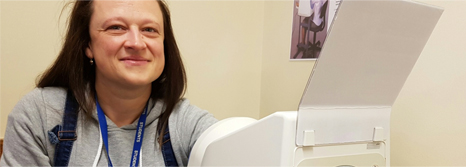Rhondda cluster collaboration pays off for patients

GPs in the Rhondda are developing new ways of working as part of a £1m a year plan to improve patient care.
A network of 15 practices serving more than 80,000 patients in Rhondda was formed into a ‘cluster’ to collaborate more with each other and other primary care services.
Rhondda received £190,272 to fund the initiative last year, with the allocation rising to £315,575 this year, out of the increased £1m pot for Cwm Taf University Health Board area.
Ian O’Sullivan, a GP in Porth, said the funding had already provided new technology in surgeries, such as blood pressure ‘pods’ in waiting rooms, enabling patients to take their own BP readings, saving time with their GP.
Christelle McDonagh (pictured), 40, from Tonypandy, was one of the first patients taking advantage of the new BP-pod at Penygraig surgery in Rhondda.
She said: “It is so simple to use. You just put your arm into the pod and press the green button. It is as easy as that. The doctors and staff are so busy and this saves everyone’s time.”
Doctors now all have computer tablets to take on home visits and to nursing homes to allow remote access to patients’ history while surgeries have installed ECG machines with blue tooth connectivity to update records.
Screens have been installed in waiting rooms to deliver health information as well as announce the next appointment.
The cluster’s allocation is also targeted at initiatives to improve access to services, like pharmacists appointed at cluster level to meet local need and relieve pressure on GP teams.
A shift from hospital to community based care aims to build services closer to home, relieving demand on hospitals.
The programmes plan and deliver care proportionate to need, such as the cardiovascular risk health checks which is aimed at more deprived communities.
The up-skilling of the primary care team creates capacity and capability to resource the cluster work
Dr O’Sullivan said: “We are looking at different ways of working, including the appointment of personal assistants for doctors to take over some of the paperwork which can be done by someone else. We have begun to work more collaboratively as practices within the cluster, sharing ideas of working better as well as expertise and this will improve even more as we go forward.
For example, two surgeries now provide child and adolescent mental health services for the area.
We have hugely improved access to physiotherapy services where waiting times have reduced from four to six months in some cases to 24 hours. We are working as a cluster on wound dressing clinics. We are looking to employ pharmacists across the cluster to streamline the workflows and give patients more access,” he said.
“Practice managers are collaborating in areas such as clinical governance and child protection policies.”
Sarah Bradley, primary care development manager for Cwm Taf University Health Board, said the formation of the clusters was a Welsh Government initiative to allow GPs more say in the services they deliver to their areas.
The aim is to encourage collaboration and develop local action plans to better meet patients’ needs, integrate care with partners and to reduce inequalities.
“GP practices are working together more than ever and we can see the difference it makes for patients,” she said.
Share on Twitter